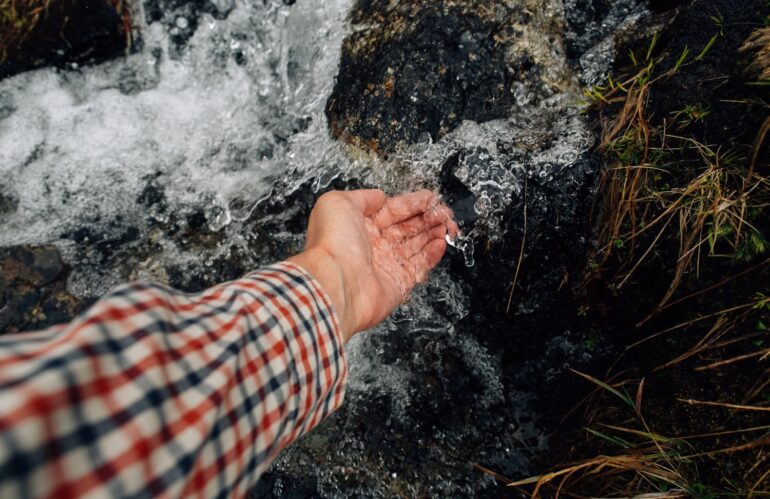The element that gives life, water, permeates every part of our world and leaves a mark that profoundly alters ecosystems. This article explores the amazing role that water plays in ecosystems, both terrestrial and aquatic, as well as how climate change and human activity are affecting these watery legacies.
The Lifeblood of Nature: Water’s Role in Ecosystems
Water is the global life-giver, allowing life to exist anywhere on Earth. It interweaves the strands of ecosystems into the vast tapestry of nature. It is the necessary component and the very basis for the existence of life.
Water is a Fundamental Element in All Ecosystems
Ecosystems, whether lush rainforests or arid deserts, rely on water. Plants and animals, from towering trees to microscopic organisms, depend on water to survive and grow.
How Water Sustains Life
Water’s magic lies in its ability to transport nutrients and minerals to plant roots and carry away waste. It’s the conductor of the orchestra, ensuring the symphony of life plays on.
The Water Cycle and Its Significance
The water cycle, a never-ending dance of evaporation, condensation, and precipitation, ensures that water is constantly recycled and redistributed, nourishing ecosystems worldwide.
Water in Terrestrial Ecosystems
Now, let’s explore how water influences terrestrial ecosystems.
Water’s Impact on Plant Growth and Survival
In rainforests, where rainfall is abundant, towering trees compete for access to sunlight and nutrients. In contrast, desert plants have evolved unique adaptations to conserve water.
Animal Adaptations to Varying Water Availability
Animals in arid regions have developed ingenious ways to survive without much water, while amphibians and fish thrive in wetlands and freshwater ecosystems.
The Role of Wetlands and Freshwater in Terrestrial Ecosystems
Wetlands act as nature’s sponges, filtering water and providing habitat for a myriad of species. Meanwhile, freshwater rivers and lakes are oases in the heart of diverse terrestrial ecosystems.
Aquatic Ecosystems: A Watery Wonderland
The world beneath the surface is a realm of wonder and diversity.
The Diversity of Aquatic Ecosystems
Oceans, rivers, and lakes host an incredible array of life, from the smallest plankton to the largest whales. Each ecosystem has its unique characteristics.
Importance of Oceans, Rivers, and Lakes
Oceans, covering over 70% of Earth’s surface, are vital for regulating climate and providing sustenance. Rivers and lakes, though smaller in scale, are no less important.
The Unique Challenges of Aquatic Life
Life underwater comes with challenges like buoyancy, pressure, and buoyancy, requiring unique adaptations for survival.
The Ripple Effect: Water’s Ecological Impact
Water is not just a passive element; it’s an active force shaping ecosystems.
Interactions Between Species in Aquatic Ecosystems
Intricate webs of life are created in aquatic ecosystems by competition for resources, mutualistic partnerships, and predator-prey connections.
How Pollution Disrupts the Delicate Balance
Human activity is contaminating our rivers, threatening aquatic life as well as the ecosystem as a whole. Examples of this include plastic garbage and industrial runoff.
The Cascading Effects of Water-Related Changes
Alterations in water temperature, salinity, and acidity can lead to extensive ramifications, impacting not just aquatic organisms but also the linked terrestrial ecosystems.
Human Activities and Water Ecosystems
Water ecosystems are significantly impacted by human activity.
The Human Impact on Water Resources
The expansion of human populations, deforestation, and urbanization are placing increasing pressure on our water resources, jeopardizing the equilibrium of ecosystems.
Pollution and Its Consequences
Pollution, from oil spills to chemical contaminants, poses a grave threat to aquatic ecosystems, endangering countless species.
Conservation Efforts to Protect Aquatic Ecosystems
Scientists and environmentalists are working tirelessly to protect water ecosystems, from establishing marine reserves to cleaning up polluted rivers.
Adapting to a Changing Climate
Climate change is reshaping the way water interacts with ecosystems.
How Climate Change Affects Water Availability
Rising temperatures and altered precipitation patterns are causing shifts in water availability, affecting ecosystems and species distribution.
Species Adaptation and Migration
Some species are evolving to cope with the changing conditions, while others are forced to migrate to survive.
Mitigation Strategies to Combat Climate Change
Addressing climate change is critical to preserving water ecosystems. From reducing carbon emissions to sustainable agriculture, there are ways to make a positive impact.
Water as a Source of Inspiration
Water’s influence extends beyond science and ecology.
The Cultural and Artistic Significance of Water
Throughout history, water has been a symbol of life, purity, and change in various cultures. It often finds its way into art, music, and literature.
Water’s Role in Literature and Art
From great novels like “Moby-Dick” to famous artworks like Hokusai’s “The Great Wave,” water’s symbolism is woven into human creativity.
How Water Continues to Inspire Creativity
Even today, artists and writers continue to draw inspiration from the beauty and power of water, reminding us of its enduring influence.
The Future of Liquid Legacies
There has never been a greater pressing need to safeguard our liquid legacies than there is now when environmental issues are converging.
The Urgency of Preserving Water Ecosystems
Neglecting our water ecosystems has grave repercussions. It’s important to preserve the stability of our globe, not only aquatic life.
The Role of Sustainable Practices
Adopting sustainable habits can have a big impact, from cutting back on water use to disposing of waste properly.
Steps Individuals Can Take to Make a Difference
Water ecosystems may be preserved by every person. There are several ways to get engaged, such as cutting back on plastic use, donating to conservation groups, or supporting laws about clean water.
Conclusion
Water is the unsung hero in the vast tale of life on Earth, influencing ecosystems and igniting human ingenuity. We have to safeguard our liquid legacies in the face of pollution and climate change. It is now up to us all to take action and make sure that water keeps flowing, as it is essential to the survival of our world and will continue to support the diversity and beauty of nature for future generations.






